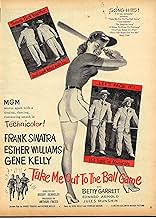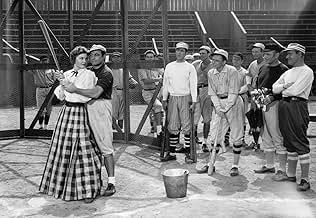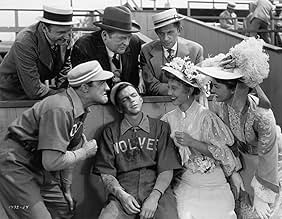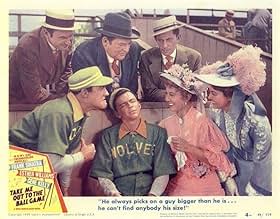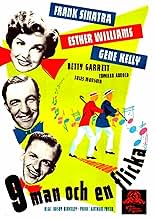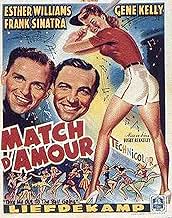Dos jugadores de béisbol profesional que durante la temporada baja trabajan en el mundo del espectáculo tienen problemas con el nuevo dueño del equipo, de nombre K.C. Higgins. Para su sopres... Leer todoDos jugadores de béisbol profesional que durante la temporada baja trabajan en el mundo del espectáculo tienen problemas con el nuevo dueño del equipo, de nombre K.C. Higgins. Para su sopresa, Higgins resulta ser una mujer.Dos jugadores de béisbol profesional que durante la temporada baja trabajan en el mundo del espectáculo tienen problemas con el nuevo dueño del equipo, de nombre K.C. Higgins. Para su sopresa, Higgins resulta ser una mujer.
- Dirección
- Guionistas
- Elenco
- Premios
- 3 nominaciones en total
- Dancer
- (sin créditos)
- Wolves Player
- (sin créditos)
- Zalinka
- (sin créditos)
- Girl in Bathing Suit
- (sin créditos)
- Kid
- (sin créditos)
- Girl on Train
- (sin créditos)
- Wolves Player
- (sin créditos)
- Wolves Player
- (sin créditos)
- Wolves Player
- (sin créditos)
- Wolves Player
- (sin créditos)
Opiniones destacadas
Lively, colorful musical from MGM's golden period. Kelly and Sinatra's dance numbers light up the screen even though the musical selections are largely undistinguished. This was Sinatra's career low period and he does look like he needs a good meal, which the movie parodies. Still his voice entertains, while his soft shoe is almost as good as Kelly's. It's a typical light musical plot of boys and girls meeting up, but then things get too serious near the end and go somewhat off track. Meanwhile, Mermaid Williams looks luscious in her gowns and even gets wet in a brief pool sequence. Still she manages the dance numbers, and without a back- stroke, no less. Williams may add glamour, but Garrett adds real spark. I just wish she got more screen time. On the other hand, the comical Munchin appears a matter of taste, failing to add much to the Kelly-Sinatra combo.
All in all, the Busby Berkeley musical shows earmarks of that golden period, even if it doesn't quite obtain front rank status.
It does have short-comings, but luckily they are far outweighed by 'Take Me Out to the Ball Game's' numerous pleasures. The film does end very abruptly and the build up does feel rather rushed, and while there are no problems to be had with the chemistry between Gene Kelly and Frank Sinatra or Sinatra and Esther Williams, the latter one really does sparkle, the one between Kelly and Williams is pretty indifferent (Williams apparently was treated contemptuously by Kelly and Stanley Donen, and there are times where it shows).
On the other hand, 'Take Me Out to the Ball Game' is ravishingly filmed in Technicolor with lavishly colourful sets and costumes that are not only superbly tailored but the colour co-ordination is eye-popping and clearly a lot of thought was put into it. There are definitely more memorable songs than the ones here, where the title song is the closest to being a hit, but they are certainly very pleasant and tuneful with wonderfully tongue-in-cheek lyrics. "O'Brien to Ryan to Goldberg", "The Right Girl for Me" and "It's Fate Baby" are also good. The choreography dazzles also, especially Kelly pulling all the stops out in his Irish solo number, the barn-storming "Strictly USA" and the wonderful chemistry between Kelly, Sinatra and the under-appreciated Jules Munshin.
With the script, there are some funny and witty lines, and while the story is very slight and drags in places it does enchant, charm and there is a constant sense of cheerfulness and fun. The direction is very accomplished throughout, shining especially in "Strictly USA". The performances are great, particularly from a scene-stealing and very funny Betty Garrett. Williams is also delightfully no-nonsense, and even with her troubles off-screen the role really does play to his strengths.
Kelly's character is very broadly drawn and almost like a clown, but Kelly's humour, charm and muscular athleticism stops him from becoming annoying. Sinatra sings an absolute dream and although his type of character isn't in his comfort zone he still appeals. Munshin shouldn't be overlooked in any way, he delights in "O'Brien to Ryan to Goldberg", while Edward Arnold is deliciously theatrical while never taking one out of the film.
Overall, hugely enjoyable though with short-comings. 7/10 Bethany Cox
The action is set in the first decade of the 20th century. Ed O'Brien (Kelly) and Dennis Ryan (Sinatra) are song-and-dance men in the winter and star players for 'The Wolves', a major league baseball team, during the summer. K.C. Higgins (Esther Williams) is a rich and beautiful young woman who buys the club and becomes involved in the personal lives of O'Brien & Ryan.
Baseball is the ideal setting for a nostalgic movie of this kind, and not just because it provides a team matrix in which to slot the male stars. Baseball has a venerable history to it, so the film can be set convincingly in the past. Kelly very nearly pursued a career as short stop with the Pittsburgh Pirates, and 'The Wolves', with their overwhelmingly Irish ethnicity, are fairly obviously based on the real-life Boston Redsox.
Busby Berkeley directs in a restrained, conservative style which suits this middle-of-the-road family entertainment. Esther Williams is terrific as Katherine. She sings, she dances, she acts - and yes, she even gets to swim! Sinatra crooning a romantic ballad to Esther is one of cinema's more unlikely permutations, but it happens here.
The songs are serviceable but little more, though the lyrics are sometimes amusing, pushing metre and rhyme into interesting contortions:
"I've gone and studied up on my astrology, I'm really knowledge-y!"
The only memorable song is the title number, but that dates back to the early 1900's. A clam bake on Giddy's Landing is all-American fun and gives scope for a big production piece. Notice how Berkeley makes the most of a cramped set by filming the chorus line at an oblique angle.
If this likeable but inconsequential film has some enjoyable moments (I liked the unsporting opponent tagging out the unconscious Ryan), it also contains a few curious editing decisions. At the end of the big number at the clam bake, there is a rapid forward-reverse 'hiccup', more usually seen in pop videos. In the latter part of Kelly's solo on the wharf, the scene strangely shifts to a new set. Both Shirley and O'Brien have distracting shadows across their faces in the protracted dancing on the wharf.
The end comes a little suddenly and without proper resolution, and then we get the rather oddly tacked-on vaudeville sequence. It all works, but with considerably less polish than its sister movie, "On The Town".
It would be a lot easier for them to stick to their simple frustrations if they both didn't find themselves rapidly falling in love with Katherine as soon as she became their new owner. Along with the difficult task of trying to get their team, the Wolves, to win another pennant, the boys must find a way to control themselves around Katherine, as well as work out some sort of cogent lines for respect when it comes to flirting and mingling with her.
Punctuating this muddled relationship triangle are the film's most enthusiastic and accomplished features - its musical numbers. One of the first involves both Eddie and Dennis singing an infectious, harmonious ballad about past lovers called "Yes Indeed" with a ravishing song and dance number to accompany it. This is where the film finds its energy put to good use being that scenes that take place on the actual baseball field are slight and the relationship drama is overall petty and largely uninteresting. Having Kelly and Sinatra serve as vaudevillian performers in addition to rather narcissistic baseball players is a nice touch that works to lift the film out of whatever drudgery it would've succumbed to had it just been about the love triangle.
With that, Williams holds her ground quite nicely in a film that's populated and controlled by men and their raging hormones and pride. Her character's snarky comments and incorruptible demeanor makes her a dominant force in the film that doesn't make her easily fazed by the multitude of sexually charged comments being spewed her way for much of the film. As a result, she becomes an admirable presence with a great deal of energy and charm to offset the frequently simple-minded behavior of Eddie and Dennis.
Take Me Out to the Ball Game was the final film directed by Busby Berkeley, but was originally supposed to be directed by Gene Kelly and Stanley Donen. With Kelly's success as a performer, he was originally contracted by MGM to direct this film, but after the studio hired Berkeley to helm the project, Kelly and Donen were shifted to a screen writing credit by their producer Arthur Freed. As part of a compromise, Freed allowed Kelly to direct some of the musical scenes he did with Sinatra, despite leaving the bulk of the directorial duties to Berkeley. The result is a film that's charming through all its discombobulation, yet always watchable thanks to its gifted performers, especially Williams, who shouldn't be overshadowed by the performers with bigger names.
Starring: Gene Kelly, Frank Sinatra, and Esther Williams. Directed by: Busby Berkeley.
*** (out of 4)
Eddie (Gene Kelly) and Dennis (Frank Sinatra) are two leaders of their baseball team who also like to sing and dance on the side. The championship team learns that a new person has taken control of the team and to everyone's shock it turns out to be a woman (Ester Williams). The two men are soon fighting over the woman while Eddie also gets caught up with a gambler (Edward Arnold).
TAKE ME OUT TO THE BALL GAME isn't nearly in the same league as ON THE TOWN, the previous Sinatra and Kelly teaming but if you're a fan of the men then there's no doubt that you'll want to check this film out. While it isn't in that tier of classic MGM musicals it's still a pretty darn fun film to watch.
I think it should go without saying that the main reason to watch the film is for its cast. Both Kelly and Sinatra would obviously do much better things in their careers but they certainly had a chemistry that was undeniable. The two play well off of one another and it's somewhat shocking that Sinatra would get top-billing even though he's not in the film nearly as much. The two open and close the film with very good musical numbers and there are fun tunes throughout.
Williams is also extremely good in her role playing a tougher-than-normal woman who gives it to bother the men. Betty Garrett is good in her part as is Arnold and Richard Lane. The entire cast really does a nice job at capturing the spirit of baseball. The musical numbers, staged by Stanley Donan and Kelly, are quite good and will certainly leave you with a smile on your face.
TAKE ME OUT TO THE BALL GAME isn't a masterpiece but it's hard to deny its charm.
¿Sabías que…?
- TriviaFrank Sinatra's career was struggling at the time and this was made during a period when the only time he did well at the box office was when paired with Gene Kelly. Two of his previous solo appearances, Sucedió en mi tierra (1947) and Me besó un bandido (1948) did very poorly at the box office.
- ErroresWhen Ryan and O'Brien are performing their Vaudeville act, they sing "Take Me Out To The Ballgame", which was written in 1908, but they sing the version with the rewritten lyrics done in 1927. This film take place circa 1910.
- Citas
Eddie O'Brien: How many times have I told you to pick on somebody your size?
Dennis Ryan: There ain't nobody my size.
- ConexionesEdited into Hollywood: The Dream Factory (1972)
- Bandas sonorasTake Me Out to the Ball Game
Music by Albert von Tilzer
Lyrics by Jack Norworth
Performed by Gene Kelly (uncredited) and Frank Sinatra (uncredited)
Reprised by Esther Williams (uncredited)
Selecciones populares
- How long is Take Me Out to the Ball Game?Con tecnología de Alexa
Detalles
- Fecha de lanzamiento
- País de origen
- Idioma
- También se conoce como
- Take Me Out to the Ball Game
- Locaciones de filmación
- Productora
- Ver más créditos de la compañía en IMDbPro
Taquilla
- Presupuesto
- USD 1,725,970 (estimado)
- Tiempo de ejecución1 hora 33 minutos
- Color
- Relación de aspecto
- 1.37 : 1
Contribuir a esta página



